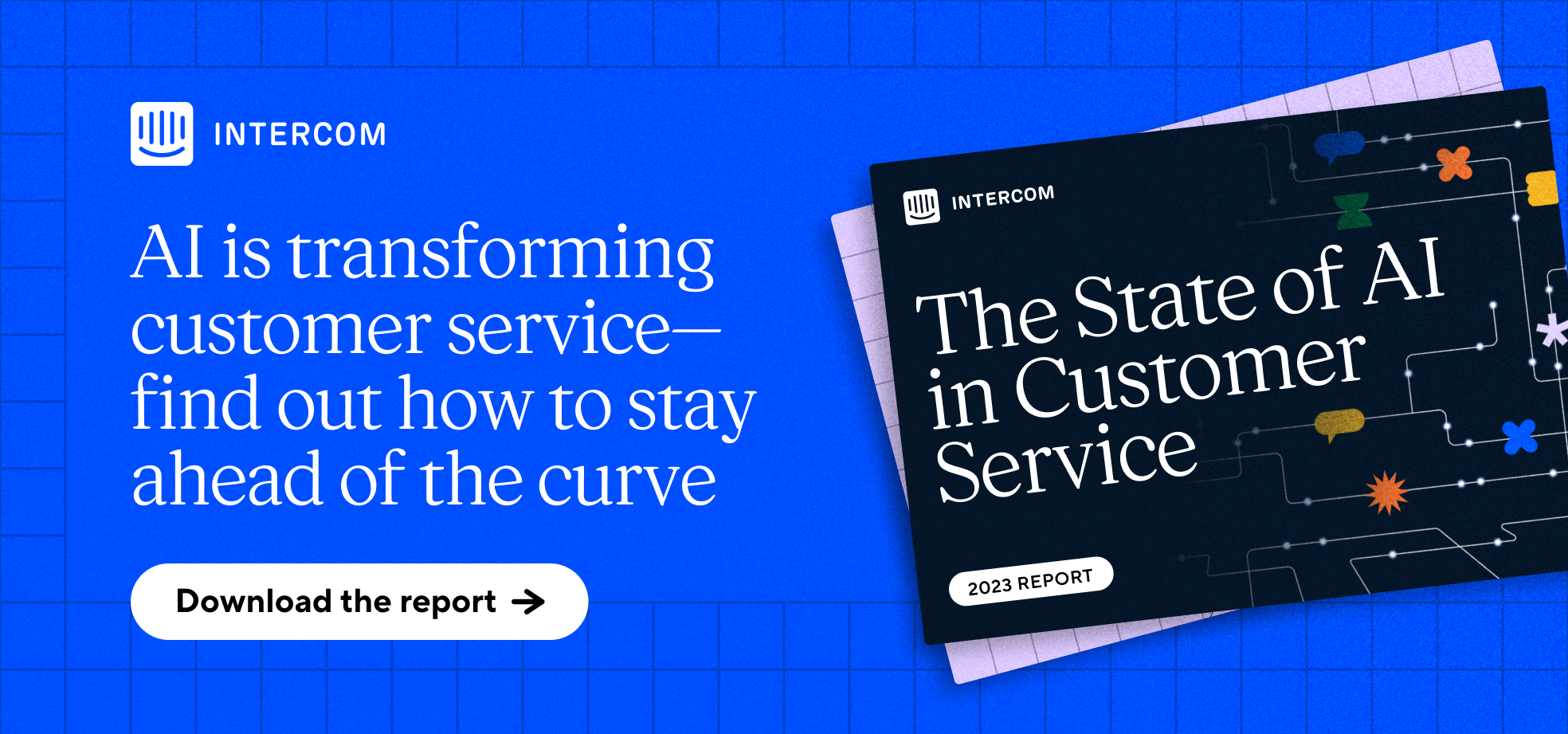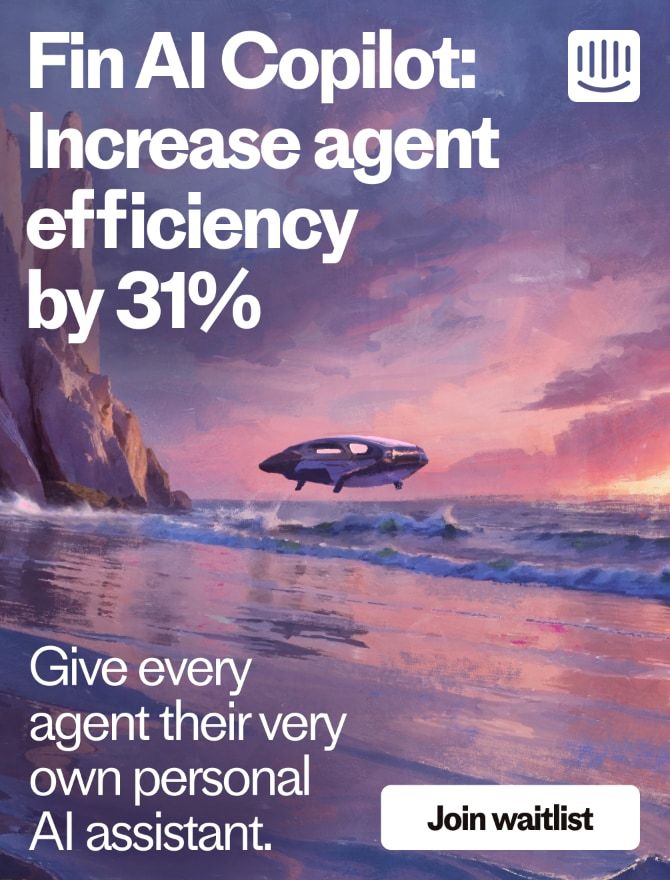
To AI or not to AI? The support leader’s dilemma
How big is the AI revolution in the customer service space, really? Well, as someone who has operated in the technology sector for over 35 years, and mostly in some form of customer support role, I have literally never been more excited than I am right now about the potential to transform the customer service experience through technology.
Over the course of my career, support has traditionally been very transactional – customers would get in touch with issues or questions, and support reps would resolve and close them out. In recent years, with the rise of online support at massive scale, customer expectations have changed dramatically. They want an experience of real ongoing value, and also a more personal experience.
“My advice to other leaders in the space is that if you are not thinking about how to apply AI in your business, it’s a huge missed opportunity”
That is a difficult transition for customer service leaders to make, but AI is suddenly making it a reality. My advice to other leaders in the space is that if you are not thinking about how to apply AI in your business, it’s a huge missed opportunity. Those who embrace AI will be in a prime position to elevate the customer experience, and in a world where customer retention is critical, this shift can be fundamental to the success of a business. The time for AI in customer service is now.
Here are some of the biggest considerations for customer service leaders as we embark on this once-in-a-generation shift in how we provide support.
Embracing a new era
The hype around ChatGPT might be very new, but artificial intelligence (AI) and machine learning (ML) have actually been around for quite some time. In the customer service space in particular, there have been a number of innovative applications of AI and ML to date, such as using natural language processing (NLP) for conversation and customer sentiment analysis, as well as earlier generations of chatbots. However, the customer service industry has been slow to adopt these tools to drive real transformation in how support is delivered. There are many reasons for this, including concerns over the scalability of the technology, along with the overhead required to use it. Up to now, companies would have needed an army of data scientists to make AI and ML work well, but that has all changed.
“We have quickly moved to a place where it is very realistic to consider using AI and ML at scale and across the entire customer service journey”
In recent months, we have seen a quantum leap forward in AI, with the announcements of ChatGPT and GPT-4 unexpectedly – but happily – catapulting us into a new era. For customer service, these developments will dramatically reduce the overhead of deploying and managing AI for support. We have quickly moved to a place where it is very realistic to consider using AI and ML at scale and across the entire customer service journey. So the question is no longer, “To AI or not to AI?”; instead, it’s, “When and how will I use it?”
The role of humans in support is evolving
💡Key takeaway
It’s natural that your team might be feeling slightly anxious about AI, so it’s important to reassure them about the importance of their roles.
I can already hear the questions about what this means for the humans of support, so I’d like to tackle the elephant in the room: AI is not replacing humans in the support world any time soon. The technology is still very much in its infancy, but even so, it can have a profound impact on how CS teams deliver support.
“AI complements the human support experience”
Human support will continue to be the best for handling the most complex and challenging issues that customers are experiencing, and also where deep customer empathy, knowledge, and context are required. The tech still can’t outsmart humans. Plus, there are times when we all just want to have the human connection and feel valued as a customer.
AI complements the human support experience by automatically resolving routine and simple queries that absorb a lot of time, freeing up support teams to proactively deliver a value-adding experience for customers with more complex issues. At the end of the day, AI is only as good as the information it has access to, so humans will play a crucial role in designing the content architecture that it will need to be successful. You also need humans to design, deploy, review, and improve the way the technology is used, which will result in new roles being created, such as “conversation designer” and “prompt engineer.”
Prepare your team for CS in the age of AI
💡Key takeaway
As support roles evolve, you will need to foster and hire for skills that will be critical in this new era of customer service.
The three key areas that I envision coming to the forefront of these roles and that support leaders should focus on are:
- Building troubleshooting skills: Issues that are going to come through to a support agent are going to be more complex, because AI will be resolving the simpler questions. So troubleshooting skills are going to be critical, and will be a priority for support teams to hone and improve in this new era of support.
- Becoming subject matter experts: Rather than being generalists, I think people are going to develop subject matter expertise in particular areas of a company’s product or service.
- Having a curiosity mindset: There’ll be a huge need for support teams to consistently ask questions about why a customer needed to reach out to a human in the first place, what the issue was, and how the team can ensure that issue doesn’t happen again. This will be pivotal in building and developing the knowledge that ultimately feeds the AI machine in the background.
Fuel new ‘voice of the customer’ insights
💡Key takeaway
The way in which you analyze your support will need to be reimagined. AI offers enhanced opportunities to surface customer insights and pinpoint where you need to drive improvements.
As a support leader, AI can help transform the way you run your support business. Imagine being able to apply AI to deeply analyze customer interactions and surface insights at scale that point to the most relevant opportunities for continuous improvement initiatives. This can empower your support operations team to drive more focused support process improvements.
These same insights can also dramatically improve your role as the internal “voice of the customer,” giving you an enhanced ability to surface customer insights that help other functions, such as product, sales, and onboarding.
Improve support quality in real time
💡Key takeaway
With AI parsing every customer interaction, you can now introduce a whole new QA process.
AI can also empower you to create a robust quality assurance (QA) process that doesn’t just sample conversations and cases for auditing support agent performance, but actually assesses all customer interactions and audits the entire customer experience.
This analysis can even be done as a conversation or case is ongoing, allowing you to use internal quality scores to identify customer situations that need to be improved in real time.
Transform the customer and support team experiences
💡Key takeaway
With AI enabling 24/7, multilingual support, your customers can get access to fast, accurate answers at any time of the day. This also frees up your team to focus on proactively providing value to customers and tackling challenging or complex queries.
I believe that AI will have a fundamental and lasting impact on the customer experience in that it gives support leaders the ability to switch on 24/7, multilingual support in a matter of minutes. For customers, this means faster answers and around-the-clock support, which is ultimately a better experience for them.
“Support can become more proactive and personalized, helping to accelerate the realization of value for your customers”
Leaders will need to put careful thought and consideration into the conversation design and choose a trustworthy AI bot to ensure that the customer experience is seamless, and that handovers between AI and human support feel natural and effortless for the customer. It’s also important to think about how the bot is integrated with other tools in your support tech stack. By ensuring everything’s well connected, you can give the bot access to relevant customer context and information to ensure each conversation feels personalized.
For your team, the most obvious benefit is that AI can remove the majority of routine and simple queries that currently take up a lot of time and enable them to focus on more challenging and interesting work that is more beneficial for the customer, as well as for their own role fulfillment. For example, AI can help to summarize long-running conversations and cases, which is ideal for handing over conversations to teammates in a follow-the-sun support model, and also allow support agents to quickly adjust the tone of their messages and use recommended answers from internal knowledge bases to save valuable time.
“AI presents customer service leaders with an opportunity to truly transform how support is delivered; it inevitably changes the economics of delivering support”
With this extra time available, your support team can begin to act in a consultative role for your customers, providing advice and guidance beyond the current issue or question that they have. This is where support can become more proactive and personalized, helping to accelerate the realization of value for your customers.
The future is here – are you ready?
💡Key takeaway
AI is changing the economics of support, and shifting the traditional “cost center” dynamic.
AI presents customer service leaders with an opportunity to truly transform how support is delivered; it inevitably changes the economics of delivering support. In the past, I – like many other leaders in the space – have tried to scale support teams and simply could not hire people fast enough to meet the demand. AI has changed that.
Now, you can continue to scale your business without having to scale your support team at the same rate. That’s a really fundamental change. It enables support at huge scale and frees up a lot of time and bandwidth for teams to add more value from the customer perspective – and from a business point of view, as well.
I hope I have convinced you that the time is now for AI in customer service. Heading up the Customer Support team at Intercom, I have had the privilege to get early access to some of the innovation that we’re driving in this space. I have been surprised and delighted by the results to date, and I am looking forward to even more breakthroughs in the coming months and years. There has never been a better time to be a leader in customer service.
Enjoy the AI voyage ahead.








